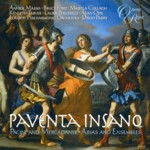This splendid collection of arias (2), trios (6), a quartet, and a duet are by Pacini and Mercadante, who, after Rossini, Bellini, Donizetti, and Verdi, were the most important composers in Italy in the first half of the 19th century. They were constantly growing and experimenting, and in the music recorded here you can hear hints of the big four other composers–Donizetti’s rhythmic thrust, Bellini’s long melodies, Rossini’s floridity and excitement, and Verdi’s dramatic sensibilities–but they are also very much their own men as well. And the love of the human voice is always paramount.
Only the two sopranos have solo arias: Majella Cullagh’s is a lovely cavatina followed by a terrifically decorated fast section from Mercadante’s Elena de Feltre; Massis’ aria is the almost 17-minute-long final scene from Pacini’s Allan Cameron. The former is a typical piece, but sung with great sensitivity and then panache, while the latter (referred to by Jeremy Commons in his superb notes as the “jewel in the crown” of the selections recorded here) begins with a military band and off-stage chorus, moves to a soprano recitative and lengthy, lyrical aria, is interrupted by baritone and chorus, and finishes with a pip of a cabaletta, more and more vocally involved. Massis is at her most limpidly lovely and virtuosic. And each soprano, elsewhere as well, exhibits fine tone, real trills, and a true passion for the idiom.
Tenor Kenneth Tarver makes two appearances: one with Massis and the fine mezzo Laura Polverelli in a placid terzetto from Mercadante’s I Normanni a Parigi; the other in another trio from Pacini’s Cesare in Egitto, joined by fellow tenor Bruce Ford (the voice a bit less focused than before but still mightily impressive) and Massis. The men sing handsome legato lines while Massis goes all florid on top. Tarver is a real find.
In a little duet from Mercadante’s Andronico, Polverelli and Cullagh chant mellowly together; Cullagh is joined by Massis in a grand trio (with baritone Alan Opie in spectacular voice) from Pacini’s Il Contestabile di Chester that ends in a stirring finale with off-stage military band. A trio from Stella di Napoli (Pacini) with Ford, Cullagh, and Polverelli features a fine clarinet obbligato.
The CD ends with a very dramatic confrontation scene from Mercadante’s Virginia for high baritone (Opie), tenor (Ford), and soprano (Cullagh). It begins with rich melodies and enters an angry, emotive mode that is thrilling and can pass for early Verdi (it would not be out of place in Ernani for melodic richness and energy). Much of the music recorded here has the appeal of well-made action films–it’s vastly entertaining and shows the stars off at their best. If lots of it isn’t “deep” the way, say, the Love Duet from Verdi’s Otello is deep, or heart-rending in the manner of “Ah, non creder mirarti” and “Ah! Non giunge” from Sonnambula, well, it’s still a pleasure to hear. And the performances couldn’t be better, with David Parry thoroughly on top of everything with his superb orchestra and chorus. [4/17/2008]
































